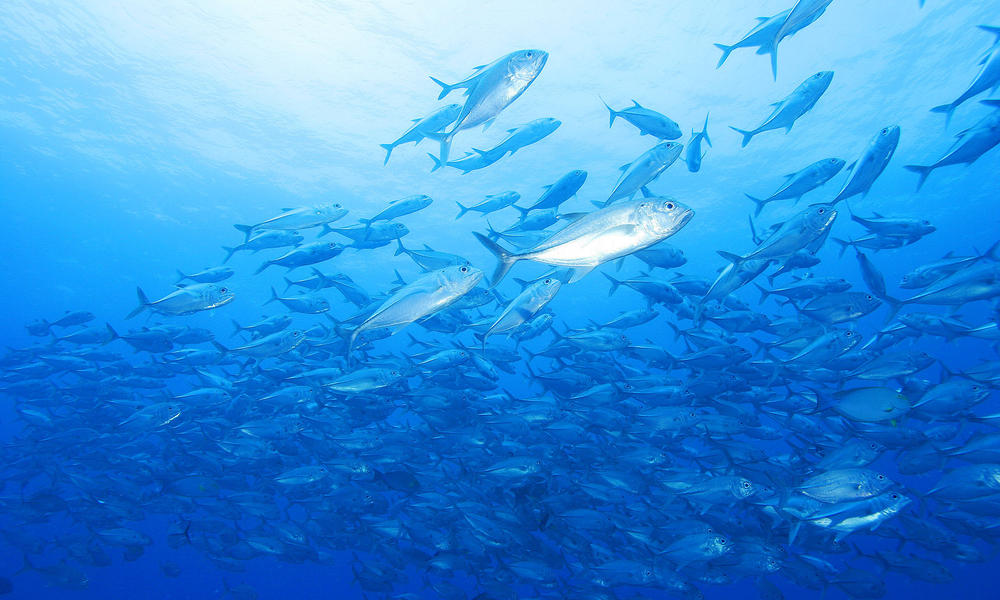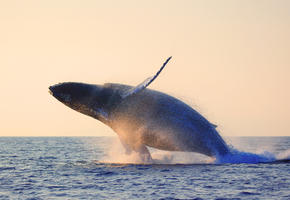An Uncertain Future for Our Living Blue Planet
Fresh, new evidence shows why we need to act on marine conservation
 © Brent Stirton / Getty Images
© Brent Stirton / Getty Images- DATE:September 15, 2015

LIVING BLUE PLANET REPORT
The new Living Blue Planet Report provides a comprehensive view of the health of the ocean and provides fresh, new evidence on why we need to act on marine conservation.
A new report on the health of the ocean finds that the marine vertebrate population has declined by 49 percent between 1970 and 2012.
WWF’s Living Blue Planet Report tracks 5,829 populations of 1,234 mammal, bird, reptile, and fish species through a marine living planet index. The evidence, analyzed by researchers at the Zoological Society of London, paints a troubling picture. In addition to the plummeting number of marine vertebrate species, populations of locally and commercially fished fish species have fallen by half, with some of the most important species experiencing even greater declines.
These findings coincide with the growing decline of marine habitats, where the deforestation rate of mangroves exceeds even the loss of forests by 3-5 times; coral reefs could be lost across the globe by 2050; and almost one-third of all seagrasses have been lost.
Global climate is one of the major drivers causing the ocean to change more rapidly than at any other point in millions of years. The oceans store huge quantities of energy and heat, but as the climate responds to increasing carbon emissions, the exchange intensifies. This may result in extreme weather events, changing ocean currents, rising sea temperatures, and increasing acidity levels—all of which aggravate the negative impacts of overfishing and other major threats such as habitat degradation and pollution.
Finding solutions for saving oceans
Though the challenge seems immense, it’s possible for governments, businesses, communities and consumers to secure a living ocean. To reverse the downward trend we need to preserve the oceans natural capital; produce better; consume more wisely; and ensure sustainable financing and governance.
Though the challenge seems immense, it’s possible for governments, businesses, communities and consumers to secure a living ocean. To reverse the downward trend we need to preserve the oceans natural capital; produce better; consume more wisely; and ensure sustainable financing and governance.
Our ocean needs a strong global climate deal and work is already underway as President Obama and leaders of the Arctic nations recently pledged to work together to boost strong action on climate change. But more needs to be done to prioritize ocean and coastal habitat health.
Speak up for oceans! Together we can make a difference by halting the depletion of the ocean and restoring damaged ecosystems for species and people.
An Uncertain Future for Our Living Blue Planet | Stories | WWF
This is from yesterday's Independent:
READ MORE: HALF OF WORLD'S SEA TURTLES 'HAVE EATEN PLASTIC'
ALMOST EVERY SEABIRD 'WILL HAVE EATEN PLASTIC BY 2050'
HOW WE CAN ALL PLAY A PART IN KEEPING OUR OCEANS CLEAN
Marine wildlife populations have halved in the last 40 years, report finds - Nature - Environment - The IndependentThe BBC recently put together the ambitious series Big Blue on successful efforts in California to conserve maritime environments:
Futures Forum: From the Monterey Bay National Marine Sanctuary......... ..... to the Lyme Bay Marine Conservation Zone
Last night Radio 4's Costing the Earth looked at the efforts currently underway in the UK's Overseas Territories:
Britain Rules the Waves
Related Links
BBC Radio 4 - Costing the Earth, Britain Rules the Waves
.
.
.













No comments:
Post a Comment